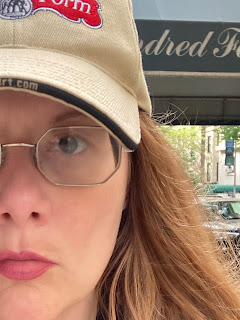Terena Elizabeth Bell is the author of the new story collection Tell Me What You See: Ten Stories. Her work has appeared in a variety of publications, including The Washington Post. She lives in New York.
Q: Over how long a period did you write the stories in your new collection?
A: Most of the stories were written in 2021, after the US Capitol attack. A handful, though, like “23,195 New Yorkers and Counting,” were written in 2020.
Q: How was the book's title (also the title of one of the stories) chosen, and what does it signify for you?
A: It’s time to wake up. As of this writing, we are 797 days away from the greatest attack American democracy has ever experienced: an attempted coup encouraged and inflamed by our very own president.
And what has happened? What have we done about it since then? Nothing. The public just walked around like zombies for a while and sent some angry tweets, then everybody went on like it didn’t happen. Everybody moved on to the next rage-filled, virtue-signaling cause.
There was an attempted coup on our nation! People died! They had a bomb! And there we all were, acting like it was just one more thing to deal with: “#2020, am I right?” 797 days. Again, 797 days.
Because I had the actual audacity to remind readers of this very real fact, I’ve had a few folks call my book political. It’s not — or at least I didn’t mean it to be.
This book is an account of what I saw between March 2020 and January 2021: a public ignoring of the Capitol “events” (Events? Call an attack an attack, people), a marked difference in approaches to coronavirus in New York (where I live) and Kentucky (where I’m from), repeat climate change crises, an increase in Alzheimer’s disease cases, and other issues.
Those are the things I saw and they aren’t Democrat or Republican, they just are. We don’t all have to agree. That’s part of this wonderful, glorious democracy I wrote to protect. But each and every one of us has a personal, individual responsibility to not be willingly blind. Ignoring 2020-2021 will not make those years go away. It will ensure that we repeat them.
So I wrote what I saw. Now you tell me, what did you see?
Q: In a review of the book in Heavy Feather Review, Dave Fitzgerald said, “Tell Me What You See is working overtime to sound the alarm; to wake us all up...” What do you think of that description?
A: I was very flattered. Tell Me What You See had of course gotten great reviews before that, but this one particular paragraph made me feel seen. He got it. A man I didn’t know had picked up my book, read it, and understood exactly why it was written.
Success in writing isn’t whether you publish or how big the publisher is or any of that stuff — it’s not even good reviews. Success is when the story you write accomplishes what you wanted it to. And when I read that review, I knew I’d done it. I had done exactly what I sat out to do.
Q: How did you decide on the order in which the stories would appear in the collection?
A: To be honest, we make ordering short story collections far harder than it needs to be. A lot of advice on the topic only serves to make writers nervous, spending months — if not years — shifting stories around like a back-alley shell game: “your collection should flow like an album,” “group pieces together in themes,” “don’t have two stories of the same length next to each other.” It can drive you out of your mind.
So I didn’t do any of that with this. I just drank a glass of red wine then pasted them in a Google Doc one right after the other.
Q: What are you working on now?
A: Isn’t that the eternal question? Tell Me What You See was a departure for me in that it’s experimental fiction. Originally from Kentucky, I normally write modern Southern gothic. My goal with this collection was to write the chaos of the times around us — as Dave said in his review, “to sound the alarm.” So now that the world is returning to normal, should the way I write?
My current work is landing in between, which I guess is sort of where we are as a nation. My fiction at least looks like fiction now (many of Tell Me What You See’s stories play with visual form), yet I find myself writing Southern gothic that experiments in subtler ways: crime fiction that incorporates physical evidence, soliloquy-like stories completely written in one character’s dialogue — things like that.
Toward this end, I’ve got a second collection I’m currently shopping (if you want it, publishers, come and get it) as well as a time-twisting, stream of consciousness novel.
Q: Anything else we should know?
A: In the review you mentioned, Dave also writes, “I thought I was over the pandemic—that I wasn’t ready to read fiction about it…that it was just too soon. But Terena Elizabeth Bell here proves that notion both lazily hubristic, and artistically wrongheaded. I don’t make this blanket statement often, but absolutely everyone should read ‘#CoronaLife’ [the longest story in the collection] and take some cathartic stock of what we’ve all just been through. It’s never too soon for work this good.”
--Interview with Deborah Kalb


No comments:
Post a Comment